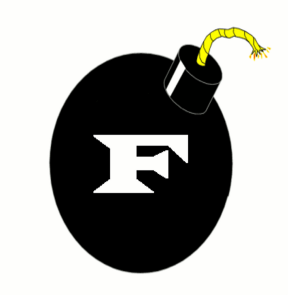Category Archives: strong language
Pardon my french
During our first page critiques, we discussed the danger of incorporating strong language on page 1 of your manuscript. Encountering an f-bomb at the outset of a novel can turn off a lot of readers, so editors are understan dably leery of acquiring works with it.
dably leery of acquiring works with it.
However, I think that strong language does have a place in novels- at least in mine. I frequently get emails or reviews from people who say things like, “I loved this book, but wish that someone had gone through and crossed out all the f-bombs for me.” Equally perplexing to me are the people who claim that they “didn’t mind the f-bombs, but at times Gagnon takes the name of the Lord in vain.”
Here’s the thing: I’m not the one doing it. My characters are, and they’re doing it because in real life, that’s how people in their particular professions and circumstances talk.
I understand that we don’t all approve of strong language- I certainly don’t use it frequently. But then, I’m rarely chasing serial killers, or trying to stop a domestic terror group from destroying Phoenix. When my characters are staring at the timer on a bomb, I don’t think “gosh” is going to be the first word to leave their lips. I try to be judicious with the swearing, but it’s most important to me to remain true to the characters spouting it. From my admittedly somewhat limited exposure to them, gang members and ex-con skinheads tend to have foul mouths. So do many law enforcement officers, especially when they’re talking to each other. I strive for accuracy in every other facet of my books. So why should I be expected to compromise on this one?
Maybe I’ve simply become inured. The places I’ve lived (including San Francisco), it’s rare to get through the day without hearing random swearing (and now that people are constantly talking loudly into their cell phones, they really seem to have lost their filter). I’ll join in on any bemoaning of what that means for us as a society. But since that experience informs my work, I can’t pretend it’s not the current reality, allowing my characters to speak as though they just stumbled off the Leave it to Beaver set.
I was raised a Unitarian, which is a religion that promotes tolerance of all beliefs. So I empathize with people who don’t condone taking the name of the Lord in vain. And yet, I can attest that my characters harken from a wide range of religious beliefs. Because of that, chances are they’re going to use such terms from time to time. And in the interest of realistic dialogue, I believe in letting them. If I were writing Inspirational thrillers, it would be an entirely different story. But I’m not.
I’m curious to hear what people think about this. Does strong language have a place in thrillers? Does it bother you, or not?

